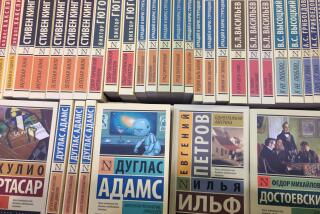In America’s Heartland, Yeltsin Hams It Up, Sheds Coat, Reaps a Media Bonanza : Midwest: Russian president winds up U.S. visit by climbing aboard a combine in Kansas.
- Share via
WICHITA, Kan. — Having conquered Washington, Russian President Boris N. Yeltsin set out Thursday to take the American heartland by storm, praising the American smile and even climbing behind the wheel of a combine to slice through a ripe field of golden Kansas wheat.
During his triumphant two-day visit to Washington, Americans saw Yeltsin the world statesman--towering, earnest, determined--a leader bent on banishing any lingering memories of “Boozin’ Boris.”
Under the hot Kansas sun, the 61-year-old president shed that demeanor and began acting as he did before he was the leader of the world’s largest country--when he was running for office as a populist outsider back home.
Winding up his U.S. visit in the very center of America, Yeltsin mugged and hammed it up with Kansans, shamelessly played to hometown pride, donned people’s caps and hoisted babies (including the 1-year-old great-grandson of Robert S. Strauss, the U.S. ambassador to Moscow).
“There is no way we will ever be even potential adversaries,” Yeltsin reassured an audience at Wichita State University in what has been the leitmotif of his U.S. visit. “No, we are friends. We made it.”
In an episode in U.S.-Russian relations that may live as long as Nikita Khrushchev’s tramp through an Iowa cornfield in 1959, Yeltsin went to a 2,000-acre family farm outside Wichita where he had been invited to a lunchtime barbecue.
There, Yeltsin hopped into the cab of a John Deere Turbo 7720 wheat combine and began cutting a swath through the field as a Secret Service agent held onto the outside rail.
“Look how neat his cutting is!” exclaimed one admiring onlooker, Yeltsin’s wife, Naina.
“It’s no accident that I picked Kansas to come to,” a perspiring Yeltsin, who had shed his tie long before, told a throng that was invited to see him at the farm of Greg and Sandra Rau, who raise wheat, soybeans and sorghum and graze a few beef cattle.
“You have the best freedom and the best wheat,” Yeltsin declared. “And the best peasants and the best farmers.”
Even in faraway Kansas, Yeltsin found proof that Marxist-Leninist philosophy--which he has said is now dead forever--harmed his country. This Midwestern state’s major crop, hard red winter wheat, was originally brought here by immigrants from Russia, Republican U.S. Sen. Nancy Kassebaum told Yeltsin.
Yields of wheat in Russia before the 1917 Bolshevik Revolution led to the massacre of that country’s most prosperous peasants were once the same as those in America, Yeltsin said, but today Kansas farmers harvest six times more per acre than the Russians do.
“This is what the Communist system did to us,” Yeltsin, the son of a peasant family, said sadly.
Residents said the visit of the Russian leader was a big moment for this city of 300,000--maybe as big as the Wichita State baseball team’s victory in the 1989 College World Series. And just as he did in Washington, Yeltsin seemed to win over people’s hearts.
“I’m startin’ to get a half-good taste about this Nelson--I mean Yeltsin,” said Duane Harrington, 49, a cabdriver originally from southwestern Kansas. He laughed. “I might have more trust in him that in some of the guys we send to Congress--you don’t see him writing any bad checks, do you?”
Some other Kansans growled that they were being subjected to a media blitz to benefit one of their senators, Bob Dole.
There were a couple of public relations gaffes. In his remarks to the students, Yeltsin kept saying how happy he was to be at the “University of Kansas,” rather than at Wichita State. And conversions from bushels per acre to the Russian crop measurement got fouled up. But it didn’t put a dent in the day.
“Mr. President, you are the man of the hour,” Dole, the Senate Republican leader, told Yeltsin after he arrived in his official Ilyushin 62 jet at McConnell Air Force Base. “In fact, the way you are going, you could be the man of the century.”
McConnell is a base that used to be part of the now-defunct Strategic Air Command, another victim of spectacularly improved relations between Washington and Moscow.
Yeltsin eyed the 11 B-1 bombers lined up on the tarmac in his honor and suggested they be taken off alert.
In a red hard hat and white smock, Yeltsin was given a tour of the Dold Foods meat-processing plant. He stood agog as he watched workers removing bones and fat from slabs of pork and running the meat through processing machines before dumping the product into stainless-steel vats.
“I have visited maybe 100 meat-processing plants, but the one you have is a real wonder,” Yeltsin exclaimed. “Plants like this should cover the whole world.”
When plant officials offered him a jacket, he spontaneously offered the manager his own suit jacket.
When he appeared at the next stop on his tour, Wichita State, only in shirt sleeves, Yeltsin quipped, “I still have my pants on.”
He told the students that Russia and America had signed 33 agreements, including a commitment by the presidents to reduce their countries’ nuclear arsenals to a third of present levels.
“What I promised,” said Yeltsin, his hand on his heart, “I will certainly do.”
More to Read
Sign up for Essential California
The most important California stories and recommendations in your inbox every morning.
You may occasionally receive promotional content from the Los Angeles Times.













